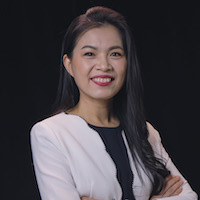When you think of women in STEM, most would picture a doctor, researcher, or academician. But at a time when the nation’s demand for skilled talent from growing ambitions in advanced manufacturing, biopharma, and digital infrastructure is higher than ever, why is the workforce falling behind in representing women in these fields?
Fewer than one in four women working in STEM in Singapore feel they have received enough support to succeed. That’s half the potential workforce that continues to be underrepresented, with risks of leaving essential capacity untapped at precisely the moment it is most needed.
Across high-stakes industries such as semiconductors, pharmaceuticals, and data centres, resilience depends on teams that can anticipate problems, adapt quickly, and deliver under pressure. And I know this from experience, even with unconventional career trajectories, so many women are more than ready to bring perspectives and skills that strengthen these teams. My own journey into STEM did not begin with an engineering degree. It started with late nights studying wiring diagrams, setbacks that nearly ended my career, and a determination to prove that grit and perseverance can matter just as much as formal qualifications. Two decades later, I’m here, leading OneSystems Technologies (OST), a company I’ve built from the ground up. We’ve been trusted with keeping some of Singapore’s most critical systems running, from semiconductor fabs to pharmaceutical facilities to national events like the National Day Parade.
STEM isn’t exactly a well-traversed single pathway road anymore. Yet too many women are excluded because the industry still measures credibility narrowly, focusing on credentials and titles rather than capability, resilience or perspective. By widening that definition, we not only create space for women to thrive but also strengthen the reliability of industries that Singapore’s future depends on.
Why women matter to STEM’s future
Industries that underpin Singapore’s growth cannot afford failure. A single error in a semiconductor plant can ripple across global supply chains. A disruption in pharmaceutical manufacturing can delay access to life-saving drugs. Data centres, meanwhile, are the backbone of digital economies. These environments require not only technical expertise but also a diversity of thought and approach to keep systems running seamlessly.
Research has shown that diverse teams are more innovative, more reliable, and better at solving complex problems. The question is not whether women can succeed in STEM. The real question is how much stronger Singapore’s industries could be if more women were given the chance to lead, innovate, and build.
Singapore’s future competitiveness depends on redefining what “belonging” in STEM means. That means valuing not just traditional qualifications but also resilience and problem-solving capabilities. It also means recognising that different pathways, whether through formal education, business backgrounds, or self-taught expertise, can lead to equally strong outcomes. When industries broaden their lens, they open the door to more women who may not fit the conventional mould but who can still excel and contribute.
What Singapore must do next
There are three shifts that are essential for Singapore to build an inclusive STEM workforce.
The first starts with redefining how we see credibility. Success in mission-critical industries is about more than academic credentials. The ability to solve problems under pressure, adapt to unexpected challenges, and deliver consistent results should be valued just as highly as formal qualifications. Employers and policymakers need to update hiring practices, leadership development, and industry recognition to reflect this broader definition of capability.
Next to that, we need to build stronger support systems. Women in STEM often face barriers that extend beyond technical knowledge: lack of mentorship, limited networks, and workplace cultures that remain male-dominated. Targeted programmes, from mentorship networks to structured industry partnerships, can help women navigate these challenges and accelerate their growth. These are not just initiatives for diversity’s sake, but investments in the resilience of the workforce.
Lastly, but surely not the least of the three, we must learn to celebrate diverse pathways. Too many potential candidates rule themselves out because they believe STEM requires a linear journey through engineering school or years of technical training. Singapore needs to highlight stories of professionals who entered STEM through alternative routes, whether through business studies, cross-disciplinary roles, or hands-on learning. These examples show that curiosity, persistence, and adaptability can be just as valuable as traditional training.
True resilience relies on how we build the workforce
Singapore’s ambitions to lead in advanced industries will not be realized by infrastructure alone. They require people who can design, operate, and safeguard the systems that power economies. Women must be part of that story, not as exceptions but as leaders and equal contributors.
My story isn’t extraordinary, but it does prove what becomes possible when resilience is valued, when persistence is rewarded, and when different pathways into STEM are recognized. If Singapore wants to build the reliable, resilient future it envisions, women must be at the centre of that journey.

Eunice Hong is the Co-Founder and CEO of OneSystems Technologies (OST), a Singapore-based provider of integrated technology solutions. Raised in a humble village, Eunice discovered her passion for business early, supporting her father’s accounts and drawing inspiration from the lives of visionary leaders. After earning a Bachelor of Commerce from the University of Adelaide, she co-founded OST in 2005 with her husband, Jason Lee, growing it into a trusted partner for international chipmakers, foundries, and OSATs.
A serial entrepreneur and advocate for social impact, Eunice also co-founded the Hope Project, which uplifts underprivileged women and students through handmade crafts, and supports global initiatives like CHOP and Royal Kids. Her guiding belief: “Do something that can enhance lives.”
TNGlobal INSIDER publishes contributions relevant to entrepreneurship and innovation. You may submit your own original or published contributions subject to editorial discretion.
Featured image: ThisisEngineering on Unsplash

